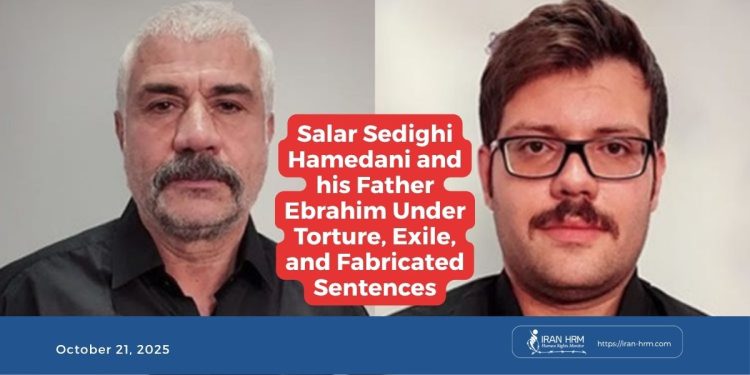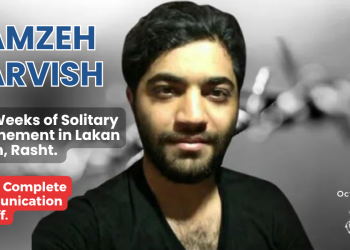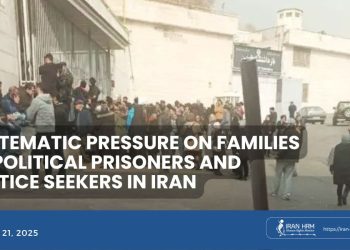Salar Sedighi Hamedani, a 27-year-old political prisoner from Urmia, has spent more than six years in various prisons across Iran — from Urmia to Kamyaran, Salmas, and now Naqadeh. Arrested as a university student, he is currently serving his sentence under inhumane conditions, deprived of medical care and family visits. Repeated fabricated charges and extended prison terms have made any prospect of release increasingly remote.
Long-term Imprisonment, Exile, and Torture
Salar Sedighi Hamedani was arrested on February 23, 2019, along with his father, Ebrahim Khalil Sedighi Hamedani, and his sister, Mahsa, by security forces in Urmia. In September 2019, the Revolutionary Court of Urmia, without granting access to a chosen lawyer, sentenced both father and son to 19 years in prison on charges of “supporting the People’s Mojahedin Organization of Iran (PMOI)” and “propaganda against the regime.”
Since then, Salar has been transferred multiple times between prisons and repeatedly subjected to violence, beatings, and torture. In Salmas Prison, a prisoner reportedly incited by prison officials attempted to stab him with a knife; fellow inmates intervened and prevented the attack.
Hunger Strikes and Medical Neglect
Salar has staged several hunger strikes in protest against his inhumane treatment and the denial of medical care. In one such case in August 2023, he suffered from a serious internal illness requiring surgery, but prison authorities refused his transfer to a hospital.
At the same time, his 66-year-old father — detained in Khoy Prison and suffering from severe diabetes — began a solidarity hunger strike. His condition deteriorated so badly that two of his toes were amputated due to untreated infection. Yet, despite the medical emergency, authorities have continued to deny him access to adequate healthcare.
Forced Separation – A Form of Psychological Torture
One of the most distressing aspects of this case is the forced separation of father and son. Ebrahim Khalil has repeatedly requested that his son be transferred to Khoy Prison to assist in his daily care, but the authorities responded by exiling Salar to Naqadeh Prison, further isolating him and inflicting psychological torment.
This separation, combined with constant interrogations, threats, and restrictions on contact, constitutes a clear case of psychological torture and inhuman treatment, in violation of Articles 7 and 10 of the International Covenant on Civil and Political Rights (ICCPR).
Fabricated Cases and Extended Sentences
In recent years, the judiciary has opened multiple new cases against Salar Sedighi Hamedani. He has received an additional seven-year sentence, followed by another five-year sentence, both issued in short court sessions held without legal representation and based on repetitive, unsubstantiated charges.
As a result, the total length of his imprisonment now exceeds 24 years. Human rights observers describe these rulings as part of the Iranian judiciary’s systematic use of fabricated indictments to suppress political dissent and prolong the incarceration of political prisoners.
Current Situation
Salar Sedighi Hamedani is currently held in Naqadeh Prison, where he is detained alongside ordinary criminal offenders — a violation of the principle of separation of prisoners by category. Reports from inside the prison indicate that he has been repeatedly beaten, denied medication, and subjected to coercive interrogations aimed at extracting forced confessions.
His father, Ebrahim Khalil, remains in Khoy Prison, in an extremely fragile condition due to advanced diabetes and chronic weakness. Their family has repeatedly warned that both men’s lives are at serious risk and appealed to international human rights organizations for immediate action.
Call for International Action
The case of Salar and Ebrahim Sedighi Hamedani epitomizes the systematic violation of human rights in Iranian prisons: arbitrary arrest, unfair trials, punitive exile, torture, denial of medical care, and extended sentences through fabricated cases.
International bodies — including the UN Special Rapporteur on the Situation of Human Rights in Iran — are urged to launch an independent investigation, demand urgent medical treatment for both prisoners, and call for their immediate and unconditional release.







